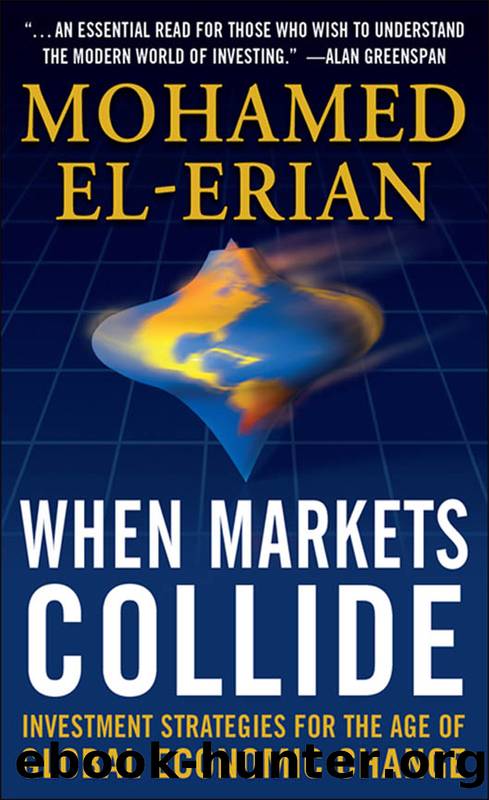When Markets Collide by Mohamed El-Erian

Author:Mohamed El-Erian
Language: eng
Format: epub
Publisher: McGraw-Hill Education
Published: 2008-09-14T16:00:00+00:00
Dealing with Surges in Capital Flows
The global phenomena of endogenous flows present a specific challenge to several emerging economies: how to deal with huge surges in capital inflows. Similar to what organic growth can do for companies, capital inflows hold the potential to lubricate the efficient and orderly growth of an emerging economy. They do so by relaxing financing constraints, completing markets, and enhancing financial integration. Moreover, the flows are often accompanied by a transfer of expertise, technology, and other institutional benefits.
Capital inflows also bring challenges. For example, they can overwhelm the domestic financial system, resulting in macroeconomic overheating as well as imprudent lending and borrowing activities at the microlevel. Studies of banking crises show that many have occurred after periods of high liquidity. Simply put, notwithstanding the presence of sophisticated firms, the financial systems in emerging economies also include institutions that are not as yet able to deal with major increases in capital inflows. As such, some of them make bad decisions, often with significantly negative results for them and for the system as a whole.
A temporary, albeit large, surge in capital inflow can also weaken the international competitiveness of the domestic economy by fueling inflation and/or pushing the exchange rate to an overly appreciated level from a medium-term perspective—that is, a level that is inappropriate when the inflows eventually slow or reverse.
This risk goes under the label of the “Dutch disease,” so named for the deindustrialization that the Netherlands suffered when huge energy (gas) reserves were discovered in the North Sea in the 1960s. The surge in foreign exchange receipts led to an appreciation of the real exchange rate and undermined the health and outlook of the nonenergy sectors.
The unfortunate irony is that countries may end up actually worse off after a period of sudden large capital inflows. At first, this sounds counterintuitive. After all, these inflows are beneficial inflows. Surely, at worst, the countries will simply be no better off. How can they be worse off?
To illustrate the underlying issues that can make this scenario occur, consider again the phenomenon of lottery winners. On the surface, there is no way that lottery winners can be worse off since they can simply give away all the winnings. Yet, there are many cases in which, within a few years of unexpectedly winning the lottery, some of the winners end up in bankruptcy. The reason is that the act of winning changes the behavior of individuals. And such changes can be either constructive or destructive.
The “psychology of money” draws on the fact that people react differently to sudden, large, and unanticipated changes in wealth. (This phenomenon served as the premise behind the 1983 film Trading Places starring Dan Aykroyd and Eddie Murphy and is among the favorites of many investors that I know.) Remember, the seed of many past banking crises in both advanced and developing economies were sowed during periods of large capital inflows and abundant domestic liquidity—an observation that is confirmed by the financial dislocation in the United States that started in the summer of 2007.
Download
This site does not store any files on its server. We only index and link to content provided by other sites. Please contact the content providers to delete copyright contents if any and email us, we'll remove relevant links or contents immediately.
International Integration of the Brazilian Economy by Elias C. Grivoyannis(57323)
The Radium Girls by Kate Moore(10907)
Turbulence by E. J. Noyes(7039)
Nudge - Improving Decisions about Health, Wealth, and Happiness by Thaler Sunstein(6633)
The Black Swan by Nassim Nicholas Taleb(6190)
Pioneering Portfolio Management by David F. Swensen(5606)
Rich Dad Poor Dad by Robert T. Kiyosaki(5149)
Zero to One by Peter Thiel(4824)
Man-made Catastrophes and Risk Information Concealment by Dmitry Chernov & Didier Sornette(4736)
Secrecy World by Jake Bernstein(3782)
Millionaire: The Philanderer, Gambler, and Duelist Who Invented Modern Finance by Janet Gleeson(3569)
Skin in the Game by Nassim Nicholas Taleb(3460)
The Age of Surveillance Capitalism by Shoshana Zuboff(3422)
The Money Culture by Michael Lewis(3284)
Skin in the Game: Hidden Asymmetries in Daily Life by Nassim Nicholas Taleb(3264)
Bullshit Jobs by David Graeber(3180)
The Dhandho Investor by Mohnish Pabrai(3168)
The Wisdom of Finance by Mihir Desai(3078)
Blockchain Basics by Daniel Drescher(2891)
